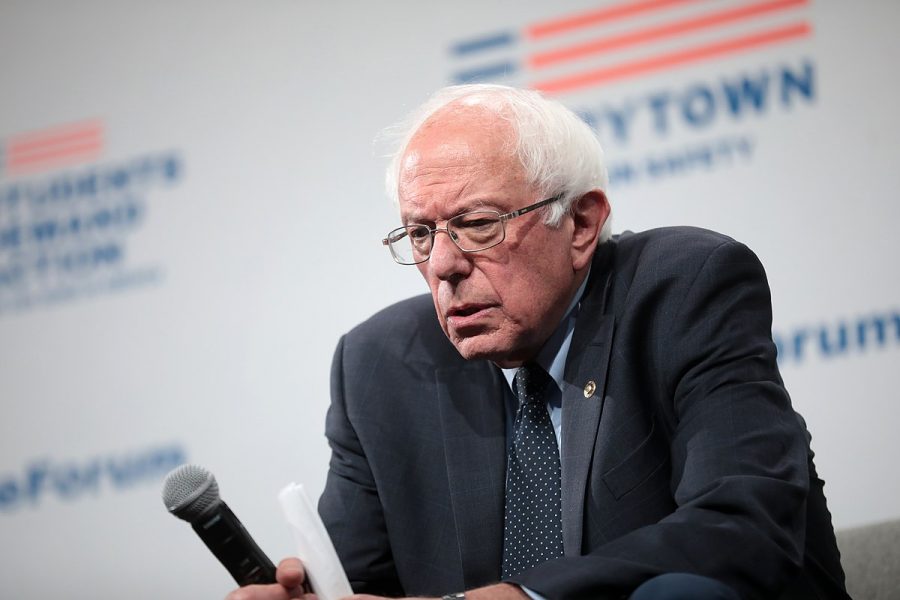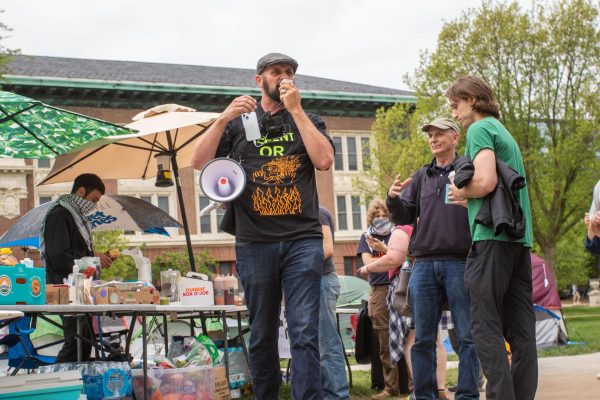Opinion | Bernie’s failure reveals delimitations for radicalism
Photo Courtesy of Gage Skidmore
U.S. Senator Bernie Sanders speaking with attendees at the Presidential Gun Sense Forum at the Iowa Events Center in Des Moines, IA on Aug. 10, 2019.
May 5, 2020
For the second time in a row, Bernie Sanders has exited the Democratic presidential primary, second place to a more moderate candidate. In the announcement of his campaign suspension, Sanders insisted that despite the loss, his base is “winning the ideological battle and … [is] winning the support of so many young people and working people.”
Sanders also announced he would stay on the remaining state primary ballots in an effort to gather delegates and “exert significant influence over the party platform.” While Sanders and his supporters may find redress in such a narrative, its facade collapses upon closer inspection of the sources of his failure.
The infiltration of the Democrats by more radical progressivism has been unmistakable in recent years. Democratic freshmen representatives — known as “the squad” — Ocasio-Cortez, Tlaib, Omar and Pressley have risen to superstardom for their shameless embracement of democratic-socialism. Divisive plans such as “the Green New Deal” and “Medicare for All” have become staples of Democratic platforms.
If Sanders was so successful at shifting the Overton Window, what went wrong? The truth is, he hasn’t.
Sanders’s supporters deemed “Bernie Bros,” overwhelmingly consist of “champagne socialists” and the younger generations of millennials and Gen Z. They tend to be white and college-educated. More importantly, they don’t represent the views of America at large.
Get The Daily Illini in your inbox!
Recent Gallup polling found “49% of millennials and Gen Z have a positive view of socialism” compared to just 39% of Gen X and 32% of baby boomers. That same polling found at large “39% of Americans have a positive opinion of socialism, compared with 57% who have a negative opinion.” Most interesting of all, Gallup observed between 2010 and 2019 the favorability of socialism among Americans has “remained within a narrow range of 35% to 39%.”
Contrary to the popular narrative, Americans haven’t forgotten the Iron Curtain, and they aren’t swinging wildly to the left. Sanders is less of a cause of modern radical-progressivism than a symptom of its lingering presence among Americans.
Sanders assured such unpalatability would be counteracted by a surge in turnout of the young voters he’d energized. Yet, the New York Times found “no clear evidence across the early states of much greater participation by young people.”
Garnering black support was also a long-standing issue for Sanders. Biden consistently won their overwhelming support. This may have occurred because “Biden is inextricably linked to Barack Obama,” and by extension racial process, but Sanders suffered a similar magnitude loss to Clinton in 2016.
Most importantly of all, voters didn’t believe Sanders was electable. New York Times reported even Sanders “acknowledged that he was losing the electability battle to Mr. Biden, saying voters had made clear that they thought the former vice president was the best candidate to beat Mr. Trump.”
To his credit Sanders was right about one thing in his suspension announcement, saying “this race has never been about me.” Fundraising was never an issue for his campaign, raising a record $46.5 million in private donations from his democratic-socialist base in February alone. His popularity among the youth demonstrated an adept level of charisma lacking in both Biden and Clinton. The candidate was not the problem, the platform was.
Bernie Sanders, a Senator with no current party affiliation, was doomed to fail because America knows better than to embrace such extremism. Liberals rightly recognized the shortcomings of his platform and chose a more stable candidate.
“Bernie Bros” on college campuses across the nation are understandably upset by Biden’s victory. The Democratic Socialist Party tweeted, “We are not endorsing @JoeBiden,” in an act of defiance. It’s unknown what the future holds for Sanders and his base. After Sanders’ endorsement of Biden, it seems likely they will dissolve and subsist at the fringes of moderate camps in a begrudging alliance against the right.
Sanders’ aforementioned hopes of influencing Biden and the party’s platforms beyond his campaign’s grave in the coming months is unlikely. Biden is the establishment candidate championing a “return to normalcy.” His main selling point has been his blatant moderation in comparison to Sanders. To abandon that post-primary would be bizarre and jeopardize the support upholding his coalition.
History may not forget Bernie Sanders soon, but it will move on from him. His ethos will no doubt make a return in future elections within a new revolutionary, but Americans have displayed their distaste for such a fad. The limit of the progressive push is near, and it is bound to rebound to the center.
Matthew is a sophomore in LAS.







